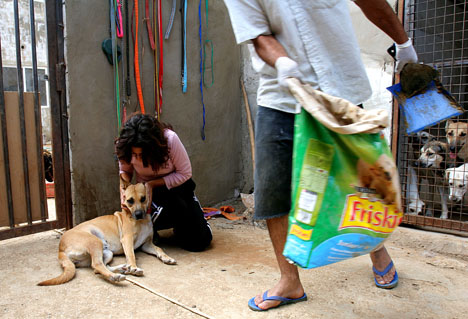Pets of Lebanese evacuees now up for adoption in U.S.

A Beirut for the Ethical Treatment of Animals (BETA) volunteer pets a dog at a farm in Monteverde, 15 kilometers (9 miles) east of Beirut, Lebanon, Saturday, Sept. 23, 2006. Some 300 homeless dogs and cats, many left behind by owners who fled Lebanon duri AP Photo/Petros Karadjias
Sep 25, 2006
Last updated on May 12, 2016 at 04:46 a.m.
BEIRUT, Lebanon – They endured a summer of war, but now relief is coming for Lebanon’s little known victims – cats and dogs abandoned when their owners fled the country during the early days of fighting between Israel and Hezbollah.
Some 300 of the former pets are being flown to the United States on Monday for adoption.
For Mona Khoury, who has helped take care of the animals the past few weeks, the rescue operation is tinged with sadness.
“I’ve grown attached to them and I’m very, very sad that they’re leaving. But I know they’ll be in good hands and have a better life there,” she said.
Get The Daily Illini in your inbox!
Khoury is co-founder of Beirut for the Ethical Treatment of Animals, which is working on the project with the American animal society Best Friends.
BETA rounded up many of the pets left behind when tens of thousands of foreigners and Lebanese with foreign passports evacuated the country in July and August.
The U.S. Embassy and others told the evacuees that pets would not be allowed on the ships and helicopters carrying them to safety, and many families had to abandon their animals or leave them with friends who later got rid of them.
Michael Mountain, president of the Utah-based Best Friends, which describes itself as America’s largest refuge for abused and abandoned pets, said in a phone interview that about 300 of the homeless pets would be put on a special cargo plane Monday and flown to the United States.
“This is certainly the largest animal airlift operation we’ve ever done overseas,” he said.
There will be two refueling stops – one in Manchester, England, and another at New York’s JFK Airport – before arriving in Las Vegas, where the orphans will be put on Best Friends trucks for a 3 1/2-hour ride to temporary housing at the Best Friends Animal Sanctuary in Kanab, Utah.
“Once there, the pets will undergo a final health and behavior evaluation before they’re off to their new, permanent homes,” Mountain said. “We’ve already had a lot of offers to adopt these cats and dogs.”
He said the operation is costing around $250,000, most of it from donations raised by animal activists.
Best Friends arranged a similar operation just a year ago in the aftermath of Hurricane Katrina, when it moved more than 6,000 animals out of the disaster zone to new homes.
The society has also been assisting animal groups in Israel, where people also had to evacuate their homes in the north without their pets during the recent war.
But the major crisis for animals has been in Lebanon.
On July 12, at the start of what proved to be a 34-day war, BETA had to move dogs and cats from a shelter near a Hezbollah stronghold in Beirut that was repeatedly pounded by Israeli warplanes.
The animals were taken to an abandoned pig farm in Monteverde in the hills. Other BETA shelters were also damaged.
At the height of the war, the abandoned animals were featured on ABC’s “Good Morning America,” after which adoption offers from the U.S. “started coming down on us by the hundreds,” Khoury said.
Jutta Sold, a 36-year-old German animal activist who is also a BETA volunteer, said the airlift is “a very good thing.”
“It’s sad for me. I knew some of these dogs when they were just puppies, but I’m very hopeful that their chances for adoption are much better over there,” said Sold, who has adopted one of the dogs herself.
Sold also noted there are no laws to protect animals, and said chances of them being adopted are much higher in the West.





